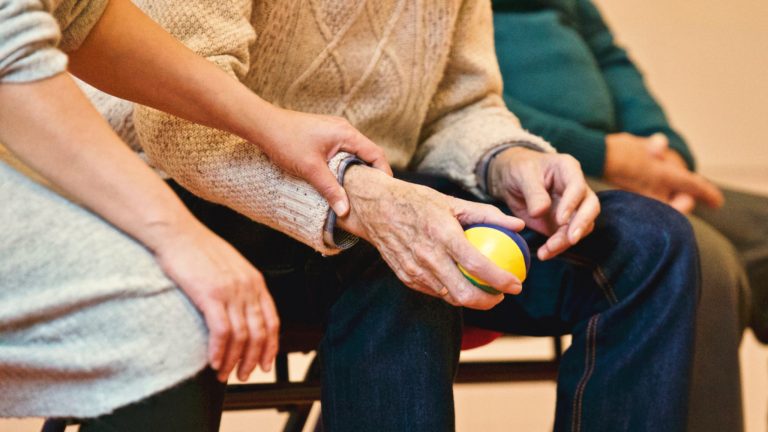Both Alzheimer’s and Dementia are progressive conditions, which means that symptoms worsen over time as the disease progresses. This article serves to educate loved ones of those diagnosed with dementia or Alzheimer’s disease on what to expect as the disease progresses.
Despite Alzheimer’s and dementia being terms that are used interchangeably, they both are different conditions and have some important distinctions between the two conditions. Dementia is an umbrella term that is used to describe several conditions, including Alzheimer’s. Since dementia is more than mere forgetfulness, there is specific criteria that someone must struggle with. In order to be diagnosed with dementia, a patient must have trouble with at least two of these cognitive areas:
- Memory
- Communication and Speech
- Focus and Concentration
- Reasoning and Judgement
- Visual Perception (including having trouble detecting movement, differentiating between colors, or even experiencing hallucinations)
The tools that professionals use to determine which stage of dementia a person is experiencing is simply a guide that gives the caregivers and medical support team a rough outline of what family members and professional caregivers alike can expect and when they can expect it. Some symptoms may surface later than others, some may appear in a different order than predicting and some may not appear at all.
Every person is different and dementia is a condition that manifests itself uniquely from case-to-case. As a result, the speed at which dementia progresses can vary widely. The average person diagnosed with Alzheimer’s disease lives 4 to 8 years post-diagnosis, but this is not a standard. Some patients can live as long as 20 years.
What Is the GDS and How Does It Measure Progression of Dementia?
As time progresses, the symptoms that a person experiences will become more and more obvious. There are several scales to measure the progression of dementia, but the most common is the Global Deterioration Scale for Assessment of Primary Degenerative Dementia (GDS).
You may have heard it referred to as the Reisberg Scale. The GDS emphasizes seven different stages of memory-related conditions that correlate with four categories:
- No Alzheimer’s
- Mild Alzheimer’s
- Moderate Alzheimer’s
- Severe Alzheimer’s
Stages 1-3: No Dementia
Stage 1
In the first stage of dementia, there aren’t any signs of dementia and the person functions normally. People without a dementia diagnosis are considered stage 1. There aren’t any signs or symptoms, no visible memory loss, no behavioral problems or anything else that would indicate the onset of dementia.
Stage 2
At this point, the disease begins to progress into stage 2. This is known as ‘very mild cognitive decline.’ In this stage, people can expect to experience normal forgetfulness attributed to the normal signs of aging. At this stage, caregivers may start to notice an elevated level of forgetfulness, but the symptoms of dementia still aren’t readily apparent to medical professionals or the person’s loved ones.
In this early stage, caregiving should be focused around finding a balance between independence and assistance. If you’re in doubt, assume your loved one can accomplish tasks on their own unless there’s a risk of safety.
Stage 3
The last stage in category 1 is mild cognitive decline. This is the point where loved ones may begin to notice the signs of cognitive decline as their family member begins to experience increased forgetfulness, a decrease in performance at work, speech difficulty, and difficulty focusing on everyday tasks. This stage is known in the medical world as ‘mild cognitive impairment’ and it’s crucial that caregivers are trained to recognize the signs of this stage for early diagnosis and intervention.
The Symptoms of Mild Cognitive Impairment
- A decrease in overall work performance.
- Increased memory loss
- Trouble concentrating, problem solving, or managing complex tasks
- Driving difficulties
- Verbal repetition
Stage 4: Early-Stage Dementia
The clinical definition of early-stage dementia only has a single stage- stage four. This is categorized as moderate cognitive decline. This stage can last an average of two years and cognitive issues are clearly detected in a medical interview and exam.
People that are in this stage of the disease will have difficulty concentrating, forget recent events, and have difficulty managing finances as well as traveling to new locations. Additionally, they may begin to experience difficulty socializing and may begin to withdraw from friends and family.
In this stage, caregivers should make an orchestrated effort to actively engage with the person suffering from dementia. Caregivers take on a more involved role at this stage and moving forward as the disease progresses, they’ll continue to have an involved role in the patient’s life.
As a caregiver, you should create a daily care plan and make adjustments to schedules as needed to provide the necessary care while seeking physical and emotional support from other caregivers.
Symptoms of Early-Stage Dementia
- Misplacing items
- Forgetting recent conversations and events
- Struggling to find the words they need in conversation
- Losing track of the day, date, and time
- Loss of interest in other people
- Unwilling to try new things
- Increased feelings of anxiety, depression, irritability, or depression
- Trouble remembering names when meeting new people
- Increased difficulty planning or organizing
Stages 5-6: Mid-Stage Dementia
This category is comprised of two stages: Stage 5, which is moderately severe cognitive decline and Stage 6, severe cognitive decline (also known as middle dementia.)
Stage 5
Mid-stage dementia lasts an average of 4 years and means that the person living with the disease now needs assistance to complete the activities of daily life. At this point, signs and symptoms of dementia are very easy to identify. Short-term memory will be mostly lost- allowing confusion and forgetfulness to be more pronounced as the person suffering goes through their day-to-day life.
Stage 6
It’s at this stage that your loved one may start forgetting the names of close loved ones and have little memory of recent events. Communication is hampered and becomes extremely difficult while delusions, compulsions, anxiety and agitation may occur.
Symptoms of Mid-Stage Dementia
- Problems sleeping
- Confusing day and night
- Behaving inappropriately in social settings
- Wandering or getting lost
- Trouble with perception
- Delusions or hallucinations
- Increased irritability and aggression
- Unable to recall personal history, address, or phone number
- Changes in sleeping patterns
Stage 7: Late-Stage Dementia
This is the final category of dementia and only includes one stage. Stage 7, also known as very severe cognitive decline lasts, on average, 2.5 years. If your loved one is in this stage, they typically have lost the ability to speak or communicate and will need assistance with most activities- including walking. At this stage, caregivers should focus on providing comfort and improving quality of life as much as possible. Care options may exceed what you or your family may feel you can provide at home because around-the-clock care will be needed.
Symptoms of Late-Stage Dementia
- Difficulty eating and swallowing
- Considerable changes in weight (either loss or gain)
- Incontinence
- Gradual loss of speech
- Restlessness
- Angry outbursts from confusion
- Increasingly vulnerable to infections.
Situations like this are always difficult but if you have a quality support system combined with quality memory care, you can make it through! If one or both of your parents need memory care in Beaverton or the Portland metro area in Oregon, contact Laurel Parc at Bethany Village to arrange a tour of the best possible care to suit their needs. Reach out to us today at (503) 533-7979 to ask any questions or arrange a visit.




